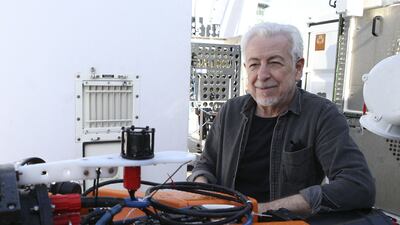A Syrian professor has been named a winner of the Great Arab Minds awards for his pioneering contributions to robotics and creation of the OceanOne deep-sea exploration robot.
In a social media post on Tuesday, Sheikh Mohammed bin Rashid, Vice President and Ruler of Dubai, hailed the work of Prof Oussama Khatib, director of Stanford University's Robotics Lab, as “groundbreaking”.
“From Syria, the land of civilisations, and from Aleppo, the city of history and science, we celebrate the brilliance of one of its sons,” Sheikh Mohammed wrote.
“His career began at Al Mamun School in Aleppo and reached the international level, becoming an honourable model for the brilliance of Arab scientists.
“We congratulate Prof Oussama Khatib on his victory, and we congratulate Syria and the city of Aleppo for its pride … and we affirm that the Arabs are capable of regaining their scientific leadership …”
Prof Khatib won the honour in the engineering and technology category of Great Arab Minds 2024.
The Great Arab Minds initiative was set up by Sheikh Mohammed in January 2023, to identify the brightest minds in the Arab world and harness their ideas. This year, the awards covered six categories – medicine, engineering and technology, economics, natural sciences, architecture and design, and literature and arts. Each winners receives Dh1 million ($272,200).
Prof Khatib has made “exceptional scientific contributions in the field of robotics engineering and science, has published more than 327 scientific papers, and has invented advanced robots capable of exploring the depths of the oceans and providing innovative solutions that serve humanity”, Sheikh Mohammed added.
Prof Khatib is credited with “groundbreaking research and innovations in robotic systems, algorithms, and sensing technologies” and how it has “significantly advanced the field, enabling robots to operate effectively in diverse environments, including healthcare, industrial automation and deep-sea exploration”.
His OceanOne robot, a humanoid robot, combines “haptic feedback, stereo vision and bimanual manipulation to replicate human skills with unmatched precision” for deep-sea exploration.
With over 327 research studies, Prof Khatib's work is said to bridge theoretical innovation with practical applications, transforming the robotics landscape globally.
This year, organisers received thousands of nominations, Sheikh Mohammed added.
The award aims to “celebrate scientists, thinkers and innovators every year”.
Nominations undergo extensive evaluation based on comprehensive criteria, including the achievement itself, evidenced results, certificates, patents, publications, books, research, and projects. The judging panels include ministers, officials, experts and specialists from across the world.

